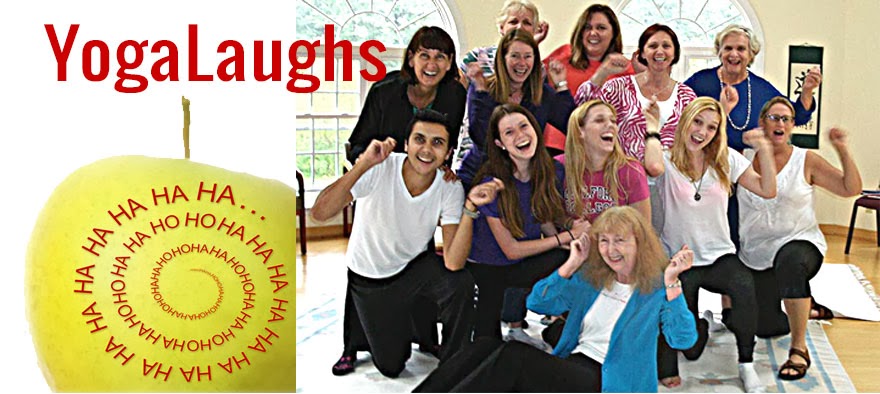I led a "play"shop today and began to teach something I've always known but not had words for about Laughter Yoga: instead of seeking another exercise routine or modality to bring "life change" - the energy of yet again going forward into something new - the experience of Laughter Yoga is about taking a step back into what has been there all along.
Laughter as communication pre-dates even humanity. We laugh in the same rhythm worldwide, studies show. No matter what the language, dialect, culture... our laughter "ha ha ha" sounds beat in a very similar percussion, so mirthful laughter is rarely misinterpreted, no matter where we are in the world. This points to universal, ancient behavior and communication. Laughter is intrinsically human. And because laughter is so innate, it's easy to overlook.
Studies show young children laugh about 400 times a day; adults laugh, if we're lucky, 15 times. Then, we laugh only in little spurts. Modern day living stresses the laughter right out of our daily lives. We're preoccupied with going forward, forward, forward, when our laughter is calling us back, back, back - into the wealth of what's been there all along.
Laughter Yoga also reverses typical thinking around mind-body practices. Generally, we begin by quieting the mind, then expect the body to follow. In Laughter Yoga, we begin pumping our diaphragms using laughter simply as breathwork or exercise. Our diaphragmatic pumping stimulates the vagus nerve, consequently the parasympathetic nervous system, and then the mind calms down. Once the brain realizes we're laughing, the happy cocktail of neurotransmitters and hormones begin to be released, and then... we feel good. Laughter yoga is my cheat sheet for almost instantly obtaining a clear, cheerful and calm mind.
Laughter Yoga flips the cultural norms about how and when mirthful laughter should happen upside down. We usually wait for something to be funny to laugh. The reverse happens during laughter yoga. We start laughing with no comedy or jokes, just as exercise, and because of the humanity of how laughter works, things begin to be funny.
Why bother? I think we're yearning to step back into the wisdom of our ancient roots these days, especially in diet and health care. We're also wanting duct-tape-like mending for our relationships. Healing that goes deeper than the mind and emotions. Laughter has it's own wisdom and impacts every layer of consciousness, creating health and intimacy. It's a unique part of each of us and common to all of humanity. Take a step back and see.
Why bother? I think we're yearning to step back into the wisdom of our ancient roots these days, especially in diet and health care. We're also wanting duct-tape-like mending for our relationships. Healing that goes deeper than the mind and emotions. Laughter has it's own wisdom and impacts every layer of consciousness, creating health and intimacy. It's a unique part of each of us and common to all of humanity. Take a step back and see.

 Meredith struggled for years with depression and anxiety, she says. But a course in Laughter Yoga at Yogaville motivated her to dedicate time every day to laughing—and she’s seen big changes in her life ever since. “The more I practice, the less depressed I am, the less stressed,” she says. “I laugh so much more and have noticed…it’s so much less problematic for me to be kind and more loving and less judgmental of myself and others.
Meredith struggled for years with depression and anxiety, she says. But a course in Laughter Yoga at Yogaville motivated her to dedicate time every day to laughing—and she’s seen big changes in her life ever since. “The more I practice, the less depressed I am, the less stressed,” she says. “I laugh so much more and have noticed…it’s so much less problematic for me to be kind and more loving and less judgmental of myself and others.